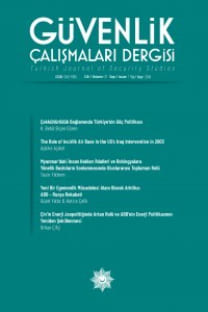Sanayi 4.0’ın Enerji Güvenliğine Olası Etkileri
Petrol’ün yeryüzündeki dağılımı, kömürle karşılaştırıldığında çok daha dar bölgelerle sınırlıdır. Bu durum, bolca petrole sahip olan, petrolü olmayan ve dünyadaki petrol alış/satışlarını kendi kontrolü altında tutmak isteyenler arasında geçmişte benzerine pek rastlanmamış ilişkilerin kurulmasına yol açtığı gibi “Enerji Güvenliği” kavramının da ortaya çıkmasına neden olmuştur. Elbette bu süreçte, insanlığın çeşitli birincil enerji kaynaklarından yararlanarak elde etmeye başladığı elektrik enerjisinden de söz etmek gerekir, zira elektrik hemen her türlü mekanik güç gerektiren alanda, ısıtmada, soğutmada rahatça kullanılabilen bir enerji türüdür ve adeta diğer tüm enerji kaynakları kullanılarak elde edilmeye çalışılan hedef enerji biçimi olmuştur. Elektrik enerjisinin hemen her alanda kullanılmaya başlaması teknolojideki gelişmeleri hızlandırmış, bilişim teknolojileri ve haberleşmenin yaygınlaşmasıyla da dünya adeta küçülmüştür
Anahtar Kelimeler:
Sanayi Devrimleri, Enerji Güvenliği, Sanayi 4.0
Possible Impacts Of Industry 4.0 On Energy Security
The distribution of petroleum on earth is much narrower in comparison with coal. This situation has led to the creation of relationships which never seen before between the parties, who have plenty of oil, who do not have oil, and who want to keep the oil trade under their control. During those days the concept of “Energy Security” was born as well. Of course, in this process, we must mention the electric energy that humanity has started to produce by using various primary energy sources, because the electricity is a type of energy that can be used comfortably in the field; heating, cooling, for any kind of mechanical power. Actually, It has become a goal to be achieved by using primary energy sources. The use of electric energy in almost every area accelerates the development of technology, and the world has become smaller by the spread of information technology and communication
Keywords:
Industrial Revolutions, Energy Security, Industry 4.0,
___
- Baysal, Başar, Lüleci, Çağla, (2015), “Kopenhag Okulu ve Güvenlikleştirme Teorisi”, Gü- venlik Stratejileri Yıl: 11 Sayı: 22, Ankara, s.61-95.
- Cherp, Aleh ve Jewell, Jessica, (2014), “The Concept of Energy Security: Beyond the Four As”, Energy Policy, S. 75, Amsterdam, s. 415-421.
- Çelikpala, Mitat, (2014), “Enerji Güvenliği: NATO’nun Yeni Tehdit Algısı”, Uluslararası İlişkiler Dergisi, Cilt 10, Sayı 40, İstanbul, s. 75-99.
- Dannreuther, Roland, (2017), Energy Security, Cambridge: Polity Press.
- Department of Energy, (2014), How Microgrids Work?, https://www.energy.gov/articles/ how-microgrids-work (ET: 05/05/2018).
- Fırat, Seniye Ü., Fırat, Oktay Z., (2017), “Sanayi 4.0 Devrimi Üzerine Karşılaştırmalı Bir İnceleme: Kavramlar, Küresel Gelişmeler ve Türkiye”, Toprak İşveren Dergisi, Sayı:114, İstanbul, s. 10-23.
- Gençtürk, Tuğçe, (2012), “Enerji güvenliği nedir? Ulusal ve Uluslararası Boyutta Enerji Güvenliği Sorunu”, Başkent Üniversitesi Stratejik Araştırmalar Merkezi Raporu, An- kara.
- Lang, Matthias, (2016), “Lang, From Industry 4.0 to Energy 4.0: Future Business Models and Legal Relations”, Digitalisierung in der Energiewirtschaft XX. Jahrestagung Ins- titut für Berg- und Energierecht Bochum, http://www.germanenergyblog.de/wp-con- tent/uploads/2016/04/160317_Lang_IBE_Bochum_From_Industry_4_0_to_Ener- gy_4_0_fin.pdf (E.T: 28/04/2018).
- PWC, (2014), Industry 4.0 – Opportunities and Challenges of the Industrial Internet, Pri- cewaterhouse Coopers Report.
- Securing the Future of German Manufacturing Industry Recommendations for Implemen- ting the Strategic Initıative, (2013), INDUSTRIE 4.0 Final report of the Industrie 4.0 Working Group, Acatech.
- Unido, (2017), Accelerating Clean Energy Through Industry 4.0, United Nations Industri- al Development Organization Report.
- Yergin, D. (2006). Ensuring Energy Security”, Foreign Affairs, Mart-Nisan, https://www. foreignaffairs.com/articles/2006-03-01/ensuring-energy-security (E.T: 09.07.2018)
- ISSN: 2148-6166
- Başlangıç: 2000
- Yayıncı: Polis Akademisi Başkanlığı
Sayıdaki Diğer Makaleler
İran’da Silahlı Muhalefetten Demokrasi Söylemlerine: Halkın Mücahitleri Örgütü
Toplumsal Bütünleşme Kapsamında Terörizmle Mücadeleye Yönelik Tutumlar ve Davranışlar
Sanayi 4.0’ın Enerji Güvenliğine Olası Etkileri
Hasan Sencer PEKER, Hakan ARSLANOĞLU
Ulusal Güvenliğin Optimal Devletini Sağlamak
Uluslararası İlişkilerde Hegemonya Kavramına Neo-Gramscian Katkı: Kuramsal Bir Analiz
